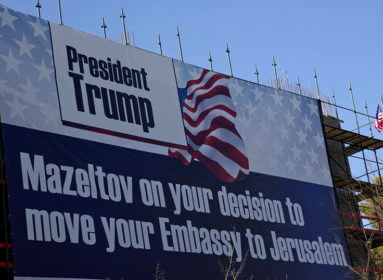The eyes of voters this election season have been focused on the presidential election. That’s true for Connecticut voters as well – but here in the nutmeg state there are several other races that are grabbing voter attention. One, of course, is the race for Senator being waged by the Democrat Chris Murphy and Republican Linda McMahon. The Ledger ran interviews with both those candidates this past summer. Now, we turn our attention to another Connecticut race to keep an eye on: That is the race to fill the Congressional seat being vacated by Chris Murphy in Connecticut’s 5th district. While there has been much debate between the two candidates – Democrat Elizabeth Esty and Republican Andrew Roraback – regarding the economic and other domestic issues, there has been little asked and answered about foreign affairs, specifically Israel and the Middle East. So we asked. Here are the candidates’ answers.
THE CANDIDATES
ELIZABETH ESTY is the Democratic nominee for Congress from Connecticut’s 5th District. A native of Oak Park, Ill., Esty, 53, was raised in Minnesota. She earned her B.A. from Harvard College and her law degree from Yale Law School. She studied international relations at L’Institut d’etudes politiques in Paris for a year on a Rotary Scholarship. In 2008, Esty was elected to the Connecticut House of Representatives from the 103rd Assembly District, representing Cheshire and parts of Hamden and Wallingford, where she served one term before being defeated in 2010. She also previously served two terms on the Cheshire Town Council. Esty and her husband Dan lived in Washington, D.C. until 1994, when they moved to Connecticut. The Estys and their three children live in Cheshire.
ANDREW RORABACK is the Republican nominee for Congress from Connecticut’s 5th District. Born in Torrington, Roraback, 52, received his B.A. from Yale University and his law degree from the University of Virginia Law School. He is a descendent of the founder of the law firm of Roraback and Roraback, which he joined in 1988. In 2006, Senator Roraback was named to the Aspen-Rodel Fellowship in Public Leadership as one of the nation’s top young elected officials. Roraback was elected to the Connecticut House of Representatives in the 64th Assembly District – encompassing Cornwall, Goshen, Salisbury and Sharon – in 1994 He served three terms before being elected as state senator from the 30th Senate District in 2000. In 2007, Roraback was elected deputy minority leader pro tempore and minority caucus chairman of the State Senate. Roraback and his wife Kara Dowling live in Goshen with their son.
LEDGER: It sometimes seems that the strong relationship between Israel and the U.S. has been under a bit of strain in recent years. In a broad sense, what is your perspective on the relationship between the U.S. and Israel?
ESTY: I am a very strong supporter of our almost 65-year alliance with Israel — the only true democracy in the Middle East. We do have a very special relationship with Israel and their vulnerability particularly in this extremely volatile time in the Middle East makes it tremendously important that the Congress and the president stand strongly to protect that relationship.
Many years ago, when I was a student, I received a Rotary International Fellowship. I studied international relations for a year and one of my classes was on the Middle East and, given that I was in Europe, I took that opportunity to visit Israel. It was in December of 1981, shortly after the assassination of Sadat, and it was an extremely tense time. I was incredibly struck by how vibrant and dynamic Israel was — by the level of love for country and commitment to building a better future for Israel. I was impressed by the optimism and resilience of the Israeli people in a time of incredible uncertainty. I was also struck by the importance of geography. As Americans it is incredibly important for us to recognize how vulnerable Israel is. I had the opportunity to stand on the Golan Heights which I’d read so much about, and I realized that on a clear day you can look across the country east to west and almost north to south. That gave me a very different perspective about the vulnerability that Israel faces. America is protected by oceans on the east and west and our neighbors to the north and south are friendly. That is not true for Israel. In stark contrast, Israel is tiny and is surrounded by neighbors who have often been quite hostile. It’s really important for members of Congress to understand and appreciate that. I was fortunate to have the opportunity at 22 years old to get a feel for that. I think the U.S. has a very important role in continuing to facilitate a peace agreement between Israel and the Palestinians, but at the end of the day it’s not something that outside forces can impose.
When I decided to run I did reach out to AIPAC early on in the process and I’ve worked closely with them to make sure I have good information and updates. I’ve got a lot of friends around the country who are very active in AIPAC, so that’s been tremendously helpful and they have been eager to provide counsel and I’m grateful for that.
These are important issues to me personally and here in Connecticut. And it’s important to our district, where we have a very active, engaged, and informed Jewish population.
RORABACK: In 2007 I was invited to participate in a fellowship which was sponsored by the Aspen Institute in Colorado, which brought together 12 young Democrats and 12 young Republicans from across the country for a two-year odyssey. We were all under 50; we were young rising political leaders. It was an amazing experience. And we were taken in 2008 to Israel, Egypt and Jordan, not on a lark but on an intensive fact-finding mission. So much of my observations are colored by first-hand experience and seeing with my own eyes the amazing country that Israel is. As much as one thinks they might be able to imagine what it’s like to be living so close to so many threats, until you are standing there in Jerusalem and looking out over Bethlehem you don’t appreciate that, and you don’t realize what an amazing place it is. So I speak from having been grounded and having met with several members of Israel’s parliament, defense force officials, and others.
My position is this: America has but one true friend in the Middle East. One reliable ally — and that is the State of Israel. Our obligation is, first of all, to keep faith with providing the ongoing security assistance that Israel depends on to keep itself secure, and so I fully support the 2007 MOU [Memorandum of Understanding] between the U.S. and Israel which promised $30 billion in aid over the next 10 years. Not only does that assistance benefit Israel, it also benefits Connecticut, because Israel invests much of that aid in purchasing hardware that is produced in Connecticut– like the engines that Pratt and Whitney makes that are used on Israeli aircraft. And so I’m of the firm belief that the Israeli people are entitled to the peace of mind of knowing that America will support them in keeping themselves secure.
When I was in Israel we were taken to Palestine and I saw with my own eyes what the conditions are and what the threats to Israel’s security are. When I was there, Hamas was firing rockets out of Gaza – which did not make my wife happy. No peace process will be successful until Palestine recognizes Israel’s right to exist. That has to be a condition precedent to a productive peace process. They need to renounce terrorism. I think it’s in the best interests of the Palestinians to agree to those conditions and I think if they do, there’s hope that the peace process can move forward constructively. But I don’t think Israel can be expected to engage in a peace process with an entity that doesn’t recognize their right to exist.
LEDGER: Prime Minister Netanyahu has made it clear that the time to take military action to curtail Iran’s nuclear program is very near. Would you support that course of action? What should our next move be to stop a nuclear Iran?
ESTY: I certainly believe and know that a nuclear Iran is entirely unacceptable — not just unacceptable to Iran’s neighbors in the Middle East including our close ally Israel, but also to us as a country. It would be incredibly destabilizing. Iran is expansive and volatile and well known for supporting organizations that are incredibly disruptive and working against the interests of the U.S. So that is a very dangerous and unacceptable possibility and I’ve been strongly supportive of and will continue to be strongly supportive of all efforts to prevent that. Now, up to this point the sanctions do appear to have been fairly successful. I’ve been pleased to see the extent to which we’ve been able to get most of our allies on board to really tighten the screws economically on Iran and I think that has had an effect. Obviously, though, Russia and China have not been as effective or as cooperative as they could be. We do need to push both those countries to be more assertive — to throw their weight upon making clear to Iran that this is entirely unacceptable for them to pursue in any way, shape or form. There may be a possibility to do that. I think the Chinese view on this may be a little different now. Their economy has slowed down and they may be more receptive to looking at that.
We also need to have reassurance that our intelligence is good regarding Iran. I was talking with friends in Boston earlier this summer who had just returned from Israel where they had spoken with friends and family who were involved with military intelligence about the extent to which the U.S. and Israel are sharing military intelligence. I think it is extremely important that we have the highest possible level of cooperation and intelligence sharing so that we know the best we can what is happening and what is being planned.
I don’t think any options can be taken off of the table because of the seriousness of what would occur if Iran were to fully weaponize, but I’m not eager to go down that road.
One of the other elements here that continues to be of great concern to me is our energy policy and the extent to which that has played into tying our hands in the Middle East in ways that are not productive. One of the areas where I do have a considerable background and interest is around energy policy and I see this as a tremendous opportunity — if we get this better and right — to make our country economically stronger, make the world cleaner and improve our national security by not have us entangled with regimes, particularly those in the Middle East, that do not share our values. I’m very committed to a robust comprehensive energy policy for this country that moves us toward renewable, affordable, sustainable energy that’s more within our control. I know it can be better for our national security. It would be better for the sustainability of the planet and this is an area where I think U.S. technology efforts and Israel technology efforts really can work hand in glove. I was sorry that I was not able to attend a conference in Hartford earlier this year on a Connecticut/Israeli technology partnership. I think it’s a tremendously fruitful area for connection – especially with our state which has lot of high tech interests and a lot of activity in the renewable and sustainable energy area. I’m a strong supporter of the kind of basic research that Israel actually has been at the forefront of in recent years, and I’d like to see the U.S. taking more of a leadership role also in research and development in the energy area. I think that will pay dividends for our country’s national security interests and can be shared with the world more broadly.
RORABACK: Like virtually all Americans and Israelis, my hope is that Iran can be brought to its knees without the need for military intervention and that’s why I’m such a strong supporter of imposing the strongest and most enforceable sanctions possible to compel Iran to abandon its nuclear ambition. I think resorting to military action should only be a last resort to prevent Iran from obtaining nuclear weapons. That decision will have to be made. I believe most observers conclude that the decision on whether or not to take military action will be upon both Israel and the U.S. very soon. The clock is ticking.
LEDGER: What role should the United States play in the current crisis in Syria?
ESTY: We need to continue to put diplomatic and economic pressure on Assad to relinquish power. It’s quite clear that his behavior is bad and getting worse and that is not only a clear and immediate threat to the Syrian people but is destabilizing for the region. You have refugees fleeing to two neighboring countries. That said, we certainly can’t allow Syria’s arsenal of chemical and biological weapons to fall into the hands of terrorists. I agree with President Obama that signs of these nonconventional weapons being prepared for use are deeply disturbing and will require a very strong and appropriate response from the U.S. Here again is an area where intelligence working closely with our allies, including Israel and our European allies, is going to be essential. Because the reality is there are not many countries that have the capability of neutralizing nonconventional weapons. So, if there are efforts to use those weapons in any way it will take some real coordination with our allies to stop that. I hope and expect that those efforts are underway right now to meet with our allies and really talk seriously right now about the logistics of what that might entail. We need to be prepared to act quickly if we see something happening and we need to share intelligence every single day.
RORABACK: I think our role should first be to try to prevail upon the Russians to refrain from continuing to supply Assad with the weaponry he’s using to kill his own people. Our goal should be to end the bloodshed. I don’t think we should commit American troops to this conflict, but I do think we should use every diplomatic avenue available to try to bring peace and stability to that country.
LEDGER: There was a bit of a brouhaha at the Democratic National Convention about the platform’s verbiage regarding Jerusalem. Would you support relocating the U.S. embassy to Israel’s capital?
ESTY: I support moving our country’s embassy to Jerusalem. It is the heart of the Jewish state. It really is the capital historically and in so many other ways.
RORABACK: We should certainly recognize Jerusalem as the capital of Israel. But as far as the mechanics of moving our embassy there, I would like to think that’s a goal that we can move toward rapidly.








 Southern New England Jewish Ledger
Southern New England Jewish Ledger











